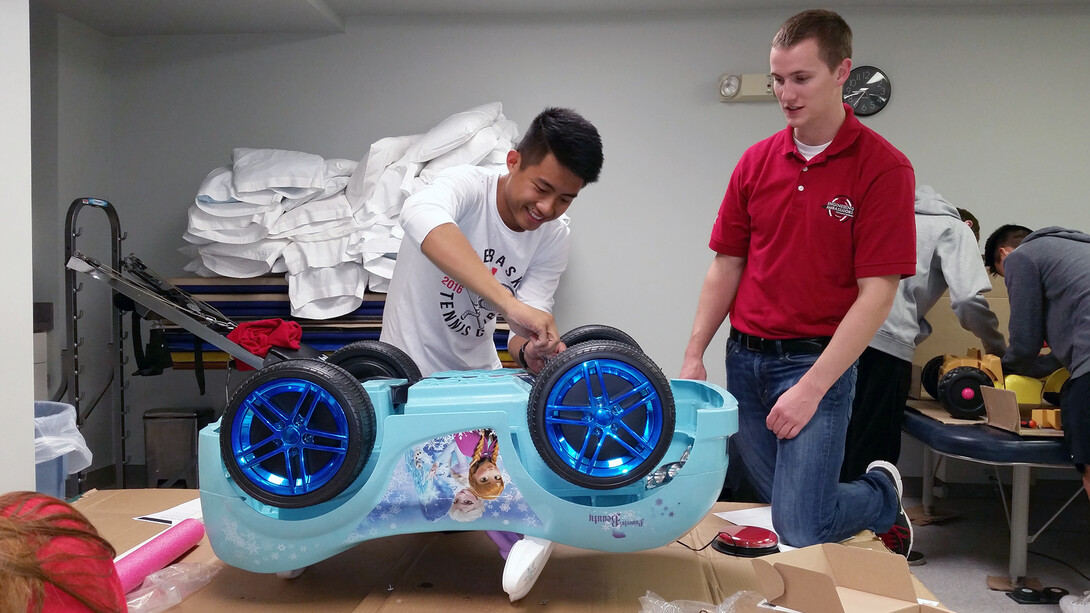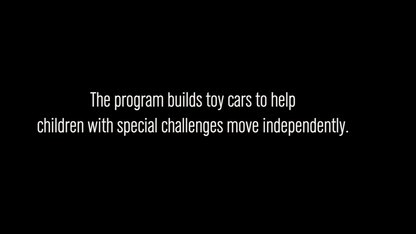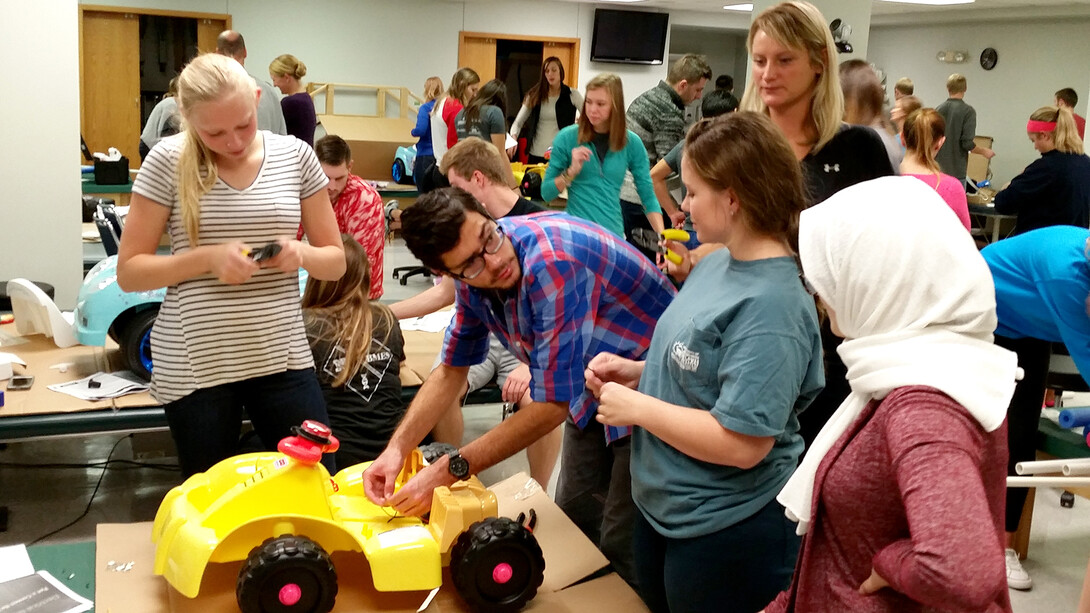
An outreach project has shown a team of University of Nebraska students how their future fields of study can impact lives.
Working through the Go Baby Go project, students from the University of Nebraska-Lincoln’s College of Engineering and the University of Nebraska Medical Center’s physical therapy program renovated electric toy cars for nine families that have children with mobility problems.
The 50 students delivered the cars to the families on Oct. 15.
“I was definitely crying a lot,” said Katie Watts, a graduate student in biological systems engineering. “You can see the tangible evidence of everything your work is doing.”
This is the second time in a year Nebraska students have participated in a Go Baby Go project. Combined, 17 families have been helped through the outreach effort.
Go Baby Go started at the University of Delaware and is designed to get children with Down Syndrome, spina bifida, cerebral palsy and other mobility-limiting conditions moving on their own. The project is important because the earlier children can determine their own movements and not rely on others for help, the better it is for their development, said Sandra Willett, interim director of physical therapy at UNMC’s Munroe-Meyer Institute.
“It doesn’t matter how you move as long as you understand that you have control of that movement,” Willett said. “Some children have very weak bodies or impaired coordination that limits movement. We want to get them moving as early as they can so they can explore their world because that’s how babies learn. Cognition and movement are closely linked in the first three years.”
While senior physical therapy students at UNMC were excited to work on the project, they turned to Nebraska engineers to modify the electric cars.
“Our kids may not be able to selectively activate the (accelerator) switch with their feet,” Willett said. “So, we adapt the steering wheel with an easy access switch that can make the car go with a light touch.”
Last spring, Willet pitched the outreach project to Watts, who was working with a UNMC team on a separate senior capstone project. Watts enlisted Jeffrey Wolstad, professor of biological systems engineering, and members of Nebraska’s student chapter of the Biomedical Engineering Society for assistance.
Woldstad, who specializes in whole-body ergonomics and rehabilitation engineering, said the biggest benefits of the collaboration are not tangible.
“The multidisciplinary part – for engineers, it’s being able to go and see what physical therapists do and then being actually able to build something for people to use right now – that’s powerful,” Woldstad said. “The hardest part of being an engineering student is the science and the math and the constant learning without ever seeing the end of what you’re going to do. With this, they see the end.”
In early August, Watts and two other engineering students, joined a group of physical therapists – under the direction of Sam Logan from Oregon State University – for the first Go Baby Go training build. Through grants from the Munroe-Meyer Guild and Olsson Associates, a Nebraska-based engineering firm, UNMC acquired eight cars and tools and materials for the conversions, including PVC pipes and plastic foam swim noodles.
The building of the cars took eight hours, including three hours of introductory instruction.
For the second build-giveaway event in October, the number of engineers participating increased to 20, including at least five first-semester freshmen.
Teams – typically consisting of one engineer and four physical therapists – gathered around therapy tables at 8 a.m. and began working on the nine cars to be given away.
One team of five Nebraska engineers worked on a “SpongeBob Square Pants” car as part of a yearlong senior design capstone project. Woldstad said that team addressed many issues with the cars, including making steering and operating the cars easier for the children.
By 11 a.m., families started to arrive and the children were introduced to their cars.
Jose Delgado couldn’t stop smiling after watching his 25-month-old daughter, Juliana, operate a “Frozen”-themed car.
“It’s going to allow her to move around. She’s not mobile and she has limited vision. Because of her special needs, she can’t have any normal kids’ toys,” Delgado said. “This will allow her to go places she hasn’t been. It will allow us to go outside and take walks and not have to use a stroller or carry her around.
“For her to do things on her own, it’s exciting. It’s like the way I felt when she was born.”
Colleen Ogburn of Bellevue, wiped away tears as she watched Zeke, her 15-month-old son with spina bifida, learn to push the button that moved his “SpongeBob” car down a hallway.
“This is pretty awesome,” Ogburn said. “His mobility is quite limited right now. I’m just thankful he’ll be able to be outside and play with his sister. It’s cool to us that he’s not just laying around watching everybody, he can interact.
“He’s really going to be able to have some adventures now.”
Moments like those helped convince Watts that engineering is the path for her future.
“In my head, becoming a doctor was the natural way of helping people, so I had my eye on medical school,” Watts said. “This was another opportunity to explore that engineering side.”
Results of the project convinced Watts not to apply to medical school.
“Through interactions like this, it made me realize that in engineering you can still have that direct connection,” Watts said.
She also hopes to remain affiliated with the Go Baby Go program and that it continues to be an outreach effort at the University of Nebraska.
“Anytime you go to work at a business or go to a school, when you leave you want to leave something behind,” Watts said. “Dr. Woldstad and Sandy and I have talked about the next steps, and it’s about finding funding so it can be an organization that can continually do this. I want to be a part of that and want it to be set (at Nebraska) so it can keep going for years and years.”









